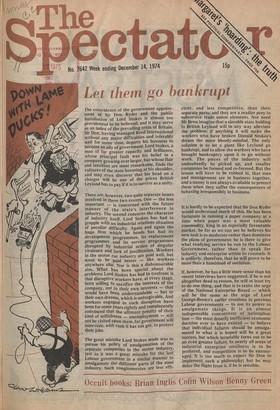Let them go bankrupt
The coincidence of the government appointment of Sir Don Ryder and the public humiliation of Lord Stokes is almost too providential to be believed; and it may serve as an index of the prevailing crisis of Britain. Sir Don, having managed Reed International without any major difficulties and tolerably well for some time, departs his business to become an ally of government. Lord Stokes, a man of far greater capacity and brilliance, whose principal fault was his belief in a company growing ever larger, but whose flair and intuition are most remarkable, finds the vultures of the state hovering at his shoulder, and may even discover that his head on a charger will be one of the prices British Leyland has to pay if it is to survive as a unity. There are, however, two quite separate issues involved in these two events. One — the less important — is concerned with the future manner of the state's interference in industry. The second concerns the character of industry itself. Lord Stokes has had to grapple with an industrial relations situation of peculiar difficulty. Again and again the huge firm which he heads has had its development programmes, its replacement programmes disrupted by and its service programmes virulence and lacdkusotrfiajul staictiteioantinonf singular . Workers in the motor car industry are paid well, but want to be paid better — like workers anywhere else. Nor is this a dishonourable aim. What has been special about the problems Lord Stokes has had to confront is that disruptive workers have, at every stage, been willing to sacrifice the interests of the company, not to their own interests — that would have been understandable — but to their own dreanis, which is unforgivable. And workers enga ged in siich disruption have been for some years rightly and complacently convinced that the ultimate penalty of their kind of selfishness — unemployment — will not be visited upon them, for government will intervene, with Cash it has not got, to protect their jobs.
The great mistake Lord Stokes made was to pursue his Policy of amalgamation of the separate companies in the motor industry, just as it was a great mistake for the last Labour government in a similar manner to amalgamate the different parts of the steel industry. Such conglomerates are less effi cient, and less competitive, than their separate parts; and they are a readier prey to subversive trade union elements. Nor need Mr Benn imagine that a sizeable state holding in British Leyland will in any way alleviate the problem: if anything it will make the workers who have broken Donald Stokes's dream the more bloody-minded. The only solution is to let a giant like Leyland go bankrupt, and to allow the workers who have brought bankruptcy upon it to go without work. The pieces of the industry will undoubtedly be picked up, and smaller companies be formed and re-formed. But the lesson will have to be rubbed in, that men and management are in business together, and a nanny is not always available to protect them when they suffer the consequences of behaving irresponsibly in business.
It is hardly to be expected that Sir Don Ryder would understand much of this. He has been fortunate in running a paper company at a time when paper was a most valuable commodity, king in an especially favourable market. So far as we can see he believes his new task is to moderate rather than dominate the plans of government: he is there to give what toadying service he can to the Labour Government, rather than to speak for industry and enterprise within its counsels. It is unlikely, therefore, that he will prove to be more than a handmaid of socialism.
If, however, he has a little more sense than his recent interviews have suggested, if he is not altogether dead to reason, he will at least try to do one thing, and that is to resist the urge of the National Enterprise Board — which will be the same as the urge of Lord George-Brown's earlier creations in previous Labour governments — to use its power to amalgamate things. It is an almost indispensable concomitant of nationalisation — the most drearily inefficient economic doctrine ever to have existed — to believe that individual failures should be amalgamated in what it is hoped will be a great success, but which invariably turns out to be an even greater failure. In nearly all areas of industrial enterprise smallness is to be preferred, and competition is to be encouraged. It is too much to expect Sir Don to implement such a philosophy; but he may delay the flight from it, if he is sensible.




















